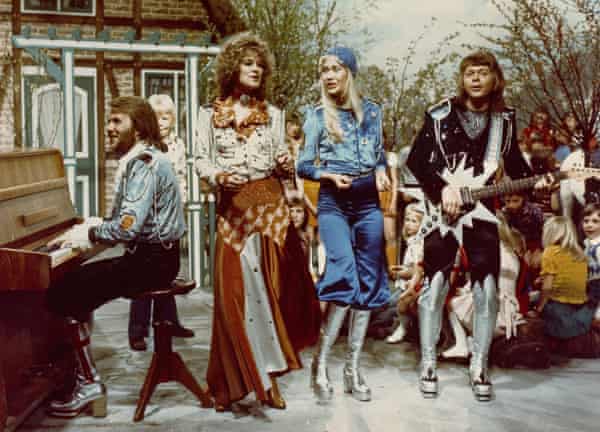Just over 41 years ago, Abba played their last concert together. It wasn’t a live show for salivating fans, but a short set for Swedish TV. A highlight was their recent hit Super Trouper, a song about the sad, endless grind of being on tour.
“All I do is eat and sleep and sing / Wishing every show was the last show,” sang Agnetha Fältskog and Anni-Frid Lyngstad, their voices still gorgeous together. The lyrics go on: “Facing 20,000 of your friends, how can anyone be so lonely?”
Fast forward to 2022, and on 27 May Abba begin seven months of gigs in a purpose-built London arena. Or rather their “Abbatars” are playing there, digital versions of the band created through cutting-edge motion capture technology.
Now in their 70s, the band were physically involved in the development of their space-age alter egos. Clips of them covered in sensors went viral after the tour announcement last September, but the Abbatars are eerily de-aged, preserved in their late 1970s pop prime.
As a lifelong Abba fan, although not an uncritical one, I’ve not yet bought tickets. I’m struggling with the idea of a band playing live without actually being there. I’m also worried that it wouldn’t move me, which would feel slightly disastrous, because of the emotional moments I associate with their songs.
My earliest memory was of hearing Abba. I was two-and-a-half. Super Trouper came on the radio when my grandmother and I were pottering about in her kitchen; she helped me sing along. The chorus spoke of someone “feeling like a number one”, which made her laugh as the song was No 1 that week. She repeated this fact often later, which helped date the memory.

Hearing its opening bars while on a recent radio show to talk about my new book, I – mortifyingly – burst into tears. They propelled me to safety and warmth, wrapped up in the memory of a person I loved very much, who is no longer here.
For me, Abba’s music has always been suffused by a very human, rough-and-ready, touching kind of love. It helps that their songs are staples of wedding discos, coaxing all generations on to the dancefloor, and forcing even the coolest kid to throw aside their pretensions.
Abba’s lyrics are also often deeply melancholic, which affords them an unusual weight in pop. Within the bounciness of Knowing Me, Knowing You, the breakdown of a marriage is picked apart. In the disco dazzle of Gimme! Gimme! Gimme! (A Man After Midnight), a female narrator is desperate, battling solitude.
But these songs are far from depressing. Intricate melodies, harmonies and hooks wrap up these lyrics, turning them into catchy masterpieces that feel strangely uplifting.
Many years after that foundational memory, I worked on Abba’s UK exhibition, Super Troupers, initially at the Southbank Centre, and later at the O2. I sifted through the band’s archives, including their tour costumes, many of them handmade. I also loved the unfussy merchandise for their last tour, in 1980, in Japan. They all felt like quaint items from a cottage industry rather than a well-oiled commercial machine.
Abba hadn’t toured often, having young children at the height of their fame (Agnetha also had a fear of flying, made worse when a 1979 private plane trip encountered a tornado). They largely turned their energies towards pop videos, directed by the Swedish artist Lasse Hallström (later an Academy Award nominee for My Life As a Dog and The Cider House Rules).
In some ways, Abba Voyageshow is an extension of these beginnings, which makes me reconsider my concerns. Still, this time round, their efforts are much less handmade, much more hi-tech.
After Abba unofficially split in 1982, they became an even bigger commercial entity. Their 1992 greatest hits album Abba Gold became the second biggest-selling album ever in the UK (it’s shifted 6 million copies to date, three-quarters of a million behind Queen’s career-spanning compilation).
In 1999, the Mamma Mia! musical began – it’s now the West End’s sixth longest-running show – and its film adaptation and sequel were also huge hits. Björn Ulvaeus and Benny Andersson were involved in the development of all of these projects, preserving and extending their legacy.
When I dwell on how canny Ulvaeus and Andersson are as entrepreneurs, I worry that the magic of Abba’s songs will dwindle inside me. I wasn’t the biggest fan of last year’s Voyage album either, despite loving the singles that launched the album. I was accused on social media of spoiling people’s fun and not understanding the power of joy. I replied to those tweets by posting my salivating Guardian essay about the merits of Dancing Queen.
The magical feelings I associate with Abba often return. Earlier this week, I listened to The Day Before You Came, a highlight of their gloriously icy 1981 album, The Visitors. I let myself get carried along in the forlorn sighs of its synthesisers, lost in the unknowable fate of Agnetha’s narrator, and it felt fantastic.
I find out I have friends going to the gigs who are dizzy with excitement. I could think of the gigs as an opportunity for fans to be together, I realise, to enjoy singing along, side by side, in giddy harmony.
If this experience means a lot to people I know, I’ll be next in the queue. To paraphrase Super Trouper, it’ll be all right, because somewhere in the crowd, there’ll be me next to you.
Jude Rogers is author of The Sound of Being Human: How Music Shapes Our Lives, published by White Rabbit
Stay connected with us on social media platform for instant update click here to join our Twitter, & Facebook
We are now on Telegram. Click here to join our channel (@TechiUpdate) and stay updated with the latest Technology headlines.
For all the latest Music News Click Here

